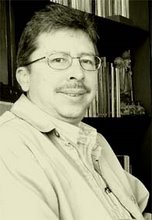Tuesday, May 16, 2007
After the thirty speeches by the representatives of the Bishops’ Conference of each country, we listened to the presentations given by the Prefects or Presidents of the Dicasteries of the Roman Curia. The Dicasteries are bodies charged with specific functions delegated by the Pope and governed by the Apostolic Constitution. At the Conference in Aparecida, ten Prefects or Presidents of such Dicasteries are present, all of them Cardinals, including William Joseph Levada, Prefect of the Congregation for the Doctrine of the Faith, who a few months ago issued the Notification against Jon Sobrino. W. Joseph Cardinal Levada succeeded Joseph Ratzinger in this office. Also attending are the Presidents of the Pontifical Council for the Family, of the Council for Culture, of the Council for Pastoral Care of Health, of the Council for Justice and Peace, of the Council for the Laity, and the Prefects of the Congregation for the Clergy and for Consecrated Life. A notorious absentee is the German Cardinal Karl Kasper, President of the Pontifical Council for Christian Unity—perhaps because ecumenism is not a priority in this Conference, in my opinion.
When someone who is in charge of a Dicastery speaks, he is expressing the will of the Pope and the Roman official position. They are here to ensure that will. That’s why their addresses were listened to with the utmost attention. Each one of them had seven minutes for his presentation. In two occasions, the ruthless traffic light turned red and, given the importance of the speaker, the President was benevolent enough to extend the term for two more minutes. After that time, the microphone would turn off, even if the speaker was a respected Cardinal. Otherwise, we wouldn’t have been able to listen to all the speeches in schedule.
The next step will be to decide on the order of the work to do (according to the rules), and then appoint the groups, commissions and sub-commissions. The President, Cardinal Errázuriz, very kindly approached the four representatives “of the Reformation” (that’s the classification given to us since Tuesday afternoon) in order to encourage us to participate with enthusiasm in the commissions and to present our points of view. We were also given five minutes for one of us to speak on behalf of the “Reformation” group. Dr. Míguez will prepare the first draft of the speech and then the others will give our contributions and remarks. Our intervention will take place this weekend or early next week.
Now, why am I giving such a detailed explanation of these procedures? Because procedure, together with daily liturgy, is an essential element of this Conference. Both the rules and the method of participation facilitate the end product. And the President has already said that the outcome of Aparecida could be a document similar to those of previous Conferences, plus a final message. This will be decided by vote by those participants with speaking and voting rights. And we from the Reformation, as could be supposed, do not have that right because we do not belong to the Catholic Church. That’s understandable.
From what we have heard in the speeches, the most frequent concerns are the loss of the Catholic identity of the Continent, the loss of members of the Church, the loss of traditional morality, the loss of faith in the Eucharist and the advance of poverty. This means that the evils to fight against could be secularism, sects, relativism and, hopefully, poverty. Will these be the agenda items? Will the progressive sectors be able to save the Church from a possible “return to the past”? Tomorrow, after the mass, the panorama will be clearer for us.
Harold



No hay comentarios:
Publicar un comentario